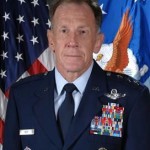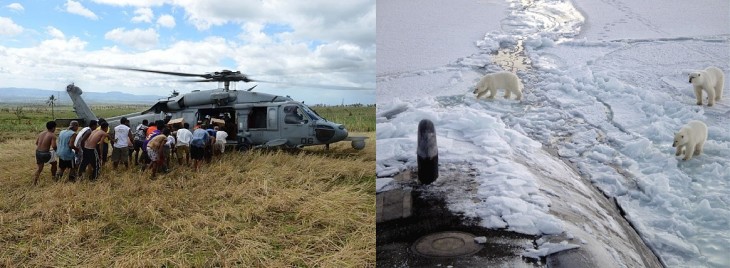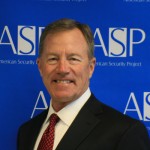Climate Change: Risks for National Security
| Date | November 9th, 2015 |
| Time | 4:00pm – 5:30pm |
| Location | College of Charleston, Stern Center Ballroom, Charleston, South Carolina 29424 |
Today, the U.S. Navy is preparing for an open Arctic, the Marines are deploying in response to historic typhoons, and the Army is preparing its bases to use less energy than they produce.
Climate change is already a major consideration for US military planners. Meanwhile, American politicians continue to ignore the issue.
Join us for a discussion with senior flag officers as they discuss the steps the US military has taken and future implications for our national security.
Speakers
BGen Stephen Cheney, USMC (Ret,)
Stephen Cheney is the Chief Executive Officer of the American Security Project (ASP) and a member of the Department of State’s Foreign Affairs Policy Board.
He is a graduate of the U.S. Naval Academy and has over 30 years experience as a Marine. His career included a wide variety of command and staff positions with the operating forces and the supporting establishment. His primary specialty was artillery, but he focused extensively on entry-level training, commanding at every echelon at both Marine Corps Recruit Depots, to include being the Commanding General at Parris Island. He served several years in Japan and has traveled extensively throughout the Middle East and Asia.
Other selected highlights of his military career include tours as Deputy Executive Secretary to Defense Secretaries Cheney and Aspin; ground plans officer for Drug Enforcement Policy in the Pentagon; liaison to the Congressional Commission on Roles and Missions of the Armed Forces; and Inspector General of the Marine Corps.
Following retirement from the Marines, he became the Chief Operating Officer for Business Executives for National Security (BENS), in Washington, D.C., and most recently was President/CEO of the Marine Military Academy in Harlingen, Texas.
He is a graduate of the Marine Corps Command and Staff College, the National War College, and the University of Southern California. He was a military fellow at the Council on Foreign Relations in New York City, where he is a member. He is also a member of the Secretary of State’s International Security Advisory Board
He has been on the Board of Directors for ASP since 2006.
Lieutenant General Norm Seip, USAF (Ret.)

Lieutenant General (ret) Norman R. Seip is a member of The American Security Project (ASP), a nonpartisan organization created to educate the American public and the world about the changing nature of national security in the 21st Century.
Lieutenant General Seip served in the Air Force for 35 years. His last assignment was Commander of 12th Air Force, comprised of seven active-duty wings and two direct-reporting units in the Western and Midwestern United States. The fighter and bomber wings under his command possessed over 400 aircraft and had more than 33,000 active-duty military and civilian assigned personnel. He was a command pilot with more than 4,500 flying hours, primarily in fighter aircraft and has flown in support of numerous military operations and contingencies around the world.
He is an independent consultant focused on defense and national security related matters. He is a Senior Mentor for the Air Force and also serves, pro bono, as the Chairman of the Board, Council for a Strong America; Military Advisory Board, Truman National Security Project; National Security Advisory Council, U.S. Global Leadership Coalition; and International Advisory Board, 911 Fund.
Andrew Holland is the American Security Project’s Director of Studies and Senior Fellow for Energy and Climate. He is a Washington-based expert on energy, climate change, and infrastructure policy. He has over seven years of experience working at the center of debates about how to achieve sustainable energy security and how to effectively address climate change.
Prior to moving into the Think Tank world, he was a Legislative Assistant on Energy, Environment, and Infrastructure for United States Senator Chuck Hagel of Nebraska from 2006 through 2008. He also has experience working in the US House of Representatives for the House Ways and Means Committee and the Office of Congresswoman Roukema.
He holds a Master’s Degree in International Strategy and Economics from the University of St. Andrews in Scotland and a Bachelor’s Degree in History and Economics from Wake Forest University in North Carolina.
Resources:
National Security and Climate Change – Perspectives from the Military
Security Impacts of Climate Change
Pay Now, Pay Later: A State-by-State Assessment of the Costs of Climate Change
Event Sponsored by the Department of Political, Office of Sustainability, the Department of Geology and Environmental Geosciences, and Masters and Minor Environmental Studies
ABOUT THE AMERICAN SECURITY PROJECT
The American Security Project is a non-profit, non-partisan public policy and research organization dedicated to fostering knowledge and understanding of a range of national security issues, promoting debate about the appropriate use of American power, and cultivating strategic responses to 21st century challenges. For more information, visit www.americansecurityproject.org.










